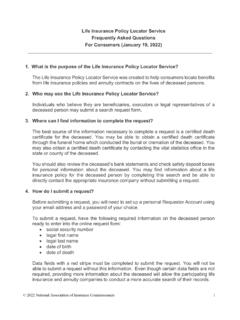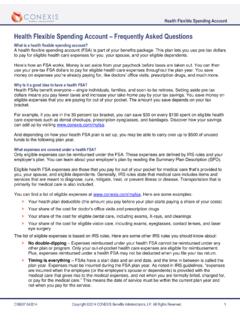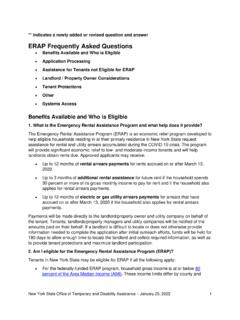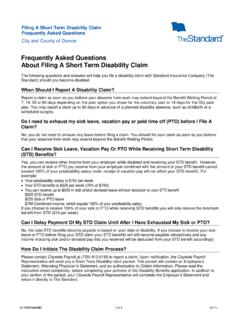Transcription of Frequently Asked Questions (FAQs) for Eligible Retired ...
1 Frequently Asked Questions (FAQs) for Eligible Retired Public Safety Officers Note: The Internal Revenue Service will have final say on the how the HELPS Retirees law will be administered. Unfortunately, the IRS guidance Notice 2007-7 issued on January 10, 2007 was not complete. Thus, NCPERS is providing its perspective on Frequently Asked Questions . Based upon our intent when we drafted the HELPS Retirees legislation, we feel the following are reasonable, good-faith interpretations of the HELPS Retirees law and the federal tax code. However, legal opinions may differ, so we strongly encourage beneficiaries to consult with their pension fund.
2 Q1: What does the HELPS Retirees benefit provide? A: The HELPS Retirees provision of the Pension Protection Act of 2006 allows Eligible Retired public safety officers to use up to $3,000 per year from their qualified government retirement plan, on a pre-tax basis, to pay for health insurance or long-term care insurance premiums. In order for you to get the pre-tax benefit, the money must be paid directly from your pension fund to a health or long-term care insurance company. Q2: Who are public safety officers? A: Public safety officers are law enforcement officers, firefighters, members of a rescue squad or ambulance crew, or chaplains to a fire or police department.
3 Law enforcement officers also include but are not limited to police, corrections, probation, parole, and judicial officers. Q3: I believe I am/was a public safety officer, but not in one of the listed categories; do I qualify for this benefit? A: The IRS has indicated that it will follow the Justice Department s definition of public safety officer. The Justice Department views public safety officers as those individuals who are involved in crime and juvenile delinquency control or reduction, or enforcement of the criminal laws (including juvenile delinquency), only if he is an officer of a public agency and, in that capacity, has legal authority and responsibility to arrest, apprehend, prosecute, adjudicate, correct or detain (in a prison or other detention or confinement facility), or supervise (as a parole or probation officer)
4 , persons who are alleged or found to have violated the criminal laws, and is recognized by such agency, or the relevant government (or, at a minimum, not denied by such agency, or the relevant government), to have such authority and responsibility. Q4: Which retirees are Eligible to take advantage of this benefit? A: Those public safety officers who have separated from service as a public safety officer and have attained normal retirement age or who are separated due to a disability are Eligible for the benefit. To take advantage of this benefit, a retiree must be receiving his or her monthly pension.
5 Q5: What if my fund doesn t use retirement age and therefore doesn t have a definition for a normal retirement age? A: The IRS has indicated that it will use the criteria for retirement established by the plans. For those plans that have no normal retirement age, it would seem that attainment of the requisite years of service or combination of age plus years for those plans using a point system would be deemed the equivalent of normal retirement age. Q6: What if I took an early retirement with an actuarially reduced pension benefit. Do I qualify for this benefit?
6 A: The HELPS Retirees law says that an Eligible Retired public safety officer is "an individual who, by reason of disability or attainment of normal retirement age, is separate from service as a public safety " The IRS has indicated that this provision eliminates the HELPS Retirees benefit for someone who took an early retirement with an actuarial reduction. Q7: OK, I know that I m an Eligible Retired public safety officer. What do I need to do to get this benefit? A: If you haven t been notified about the process for taking advantage of this benefit, contact your pension fund and ask about the HELPS Retiree $3,000 pre-tax benefit for purchasing health insurance or long-term care insurance .
7 Q8: What happens if both my spouse and I are Eligible Retired public safety officers? A: Both you and your spouse would be Eligible to use up to $3,000 each on a pre-tax basis to purchase health insurance or long-term care insurance for a total family limit of $6,000. The premiums, however, would have to be directly deducted from both you and your spouse s pension. Q9: What health insurance or long-term care insurance premium qualifies for the pre-tax payments? A: In IRS Notice 2007-7, the IRS has said only health insurance issued by insurance companies qualify for pre-tax payments.
8 However, in a letter to Congress dated May 15, 2007, the IRS has reversed its view and has said those retirees in self insured plans can take advantage of this benefit. This IRS administrative fix is retroactive to January 1, 2007 and can be relied upon by funds to begin implementation immediately. Further, due to NCPERS legislative efforts, Congress has included a legislative fix to the IRS misinterpretation in the PPA Technical Corrections bill ( ). Q10: What pension money can I use? A: Direct disbursements to health and long-term care insurance companies from your defined benefit, 403(b), or 457 plans are Eligible for the favorable tax treatment.
9 However, the total amount Eligible to be disbursed from all of your plans for pre-tax payments is limited to $3,000 per year. Q11: If my spouse and dependents who are not Eligible public safety retirees survive me, would they be able to continue to use $3,000 on a pre-tax basis to purchase health or long-term care insurance ? A: The IRS Notice 2007-7 states there are no survivor benefits . Q12: What should I do if my pension fund will not establish a program or process to allow me to take advantage of this benefit? A: The HELPS Retirees law does not require pension funds to make available this benefit.
10 Furthermore, if funds choose to establish a program or process to allow Eligible public safety officers to take advantage of this benefit, they may place some limitations on it. If your fund will not participate in HELPS Retirees or places unreasonable limitations when implementing the benefit, NCPERS suggests you contact your fund s administrator and trustees in writing to urge them to establish a program or process so that you may receive this benefit.






